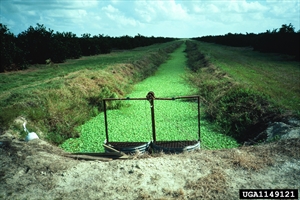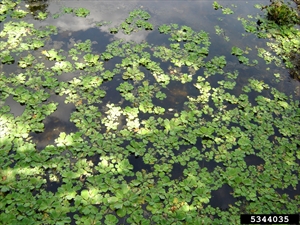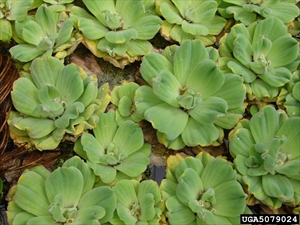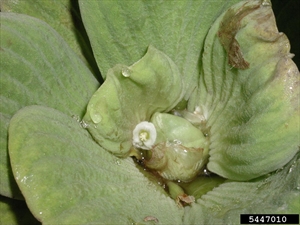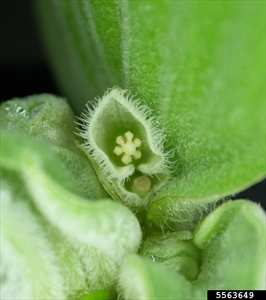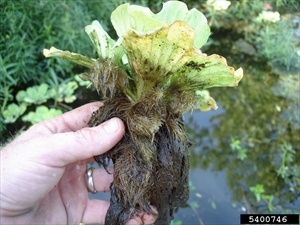- Widespread. Asia, Africa, North, South and Central America, Caribbean, Europe, Oceania. In many Pacific islands.
- Invasive free-floating freshwater weed. Major weed of lakes, dams, ponds, irrigation channels, and slow-moving waterways, forming mats that prevents water travel, destroys rice paddies, and kills native biodiversity.
- Plants, with grey-green leaves, single or connected by short stems, up to 60 cm long. Leaves, fan-shaped, 2.5-15 cm, 6-15 obvious veins, on short stalks, covered in soft white hairs trapping air bubbles for buoyancy. Flowers, clustered on small fleshy stalks. Fruit, many-seeded green berries, sink, later germinating in the shallows. Roots, numerous and feathery
- Spread: rapid vegetative reproduction; seed, by boats and fishing nets; use as aquatic ornamental.
- Biosecurity: high risk of introduction via aquarium trade; On Global Invasive Species Database of alien invasive species (IUCN, 2020). Noxious weed in South Africa and parts of USA. Available on internet.
- Biocontrol: weevil, Neohydronomous affinis, released in Africa, PNG, USA; moth, Spodoptera pectinicornis, reported in Thailand.
- Cultural control: check nutrient levels (important); floating booms; manual removal (rakes), leaving on shore to dry for 2 months; mechanical harvesting, chopping, returning as a spray.
- Chemical control: in Australia: glyphosate; 2,4-D; carfentrazone-ethyl. In Fiji, MCPA.
Pacific Pests, Pathogens and Weeds - Online edition
Pacific Pests, Pathogens, Weeds & Pesticides
Water lettuce (456)
Water lettuce; it is also known as Nile cabbage, or floating aroid.
Pistia stratiotes. It is a member of the Araceae.
AUTHORS Grahame Jackson & Aradhana Deesh
Adapted from Water lettuce (Pistia stratiotes) (2018) Weeds of SE Qld and Northern NSW. Lucidcentral. (https://www.lucidcentral.org/editors-pick-animal-and-plant-identification-keys/key-to-weeds-of-se-qld-and-northern-nsw); and additional information from CABI (2019) Pistia stratiotes (water lettuce). Invasive Species Compendium. (https://www.cabi.org/isc/datasheet/41496#tosummaryOfInvasiveness); and Pistia stratiotes L., Araceae (2013) Pacific Island Ecosystems at Risk (PIER). (http://www.hear.org/pier/species/pistia_stratiotes.htm); and from Pistia (2020) Wikipedia. (https://en.wikipedia.org/wiki/Pistia). Photo 1 USDA APHIS PPQ - Oxford, North Carolina , USDA APHIS PPQ, bugwood.org. Photo 2 Karen Brown, University of Florida, Bugwood.org. Photo 3 Troy Evans, Great Smoky Mountains National Park, Bugwood.org. Photo 4 Leslie J. Mehrhoff, University of Connecticut, Bugwood.org. Photo 5 Shaun Winterton, Aquarium and Pond Plants of the World, Edition 3, USDA APHIS PPQ, Bugwood.org. Photo 6 Graves Lovell, Alabama Department of Conservation and Natural Resources, Bugwood.org.
Produced with support from the Australian Centre for International Agricultural Research under project HORT/2016/185: Responding to emerging pest and disease threats to horticulture in the Pacific islands, implemented by the University of Queensland, in association with the Pacific Community and Koronivia Research Station, Ministry of Agriculture, Fiji.
